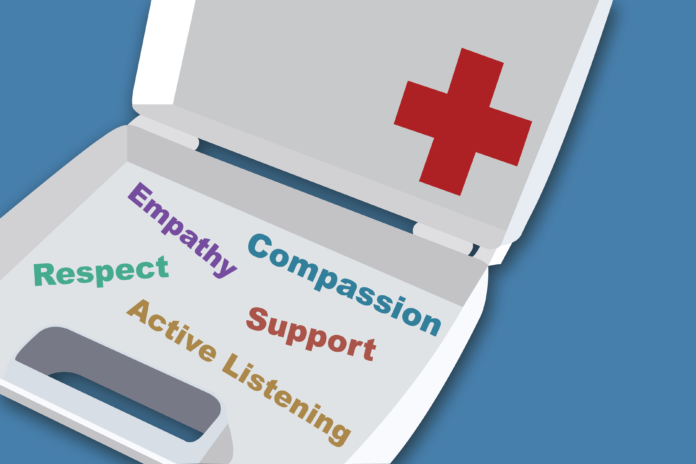It’s more like being a good friend
Unless it’s required for a job, most people aren’t well-versed on first aid procedures. Although certification training is excruciatingly long, it prepares you for emergency situations and, more importantly, it saves lives. Less widely known, the effects of psychological first aid (PFA) can last a lifetime.
Prior to the pandemic, mental health in the U.S. was already on the decline. But after weeks of quarantine filled with uncertainty and fear, our mental health took even more of a hit. A recent Washington Post article suggests that the pandemic “proves we should all know ‘psychological first aid.’”
While medical first aid involves tending to injuries of the body, psychological first aid incorporates employing techniques that aid and support a person’s mental state, rather than their physical state. Typically, psychological first aid is used by first responders to prevent post-traumatic stress disorder in post-disaster scenarios. It’s clear that psychological first aid can be used in our everyday lives and not just in a crisis situation.
PFA is something everyone should know. Unlike medical first aid, PFA doesn’t require dealing with cuts, blood or even more serious procedures like CPR––making it less nerve wracking to use.
It’s more like being a good friend. It calls for compassion, active listening, creating a feeling of safety, connecting and being hopeful. Even though this seems like something we can do without proper instruction, there are training courses that can teach us to use these techniques properly and effectively.
Sadly, it’s taken a pandemic for some to realize that many of us struggle with mental health issues. Now, not only do we have to find a way to survive a pandemic, we also need emotional damage control, so that people can make it through the pandemic emotionally and mentally. The healing must start now––not when the pandemic is over.
Start by paying attention to those around you. If you notice someone struggling, have a conversation with them and immediately start PFA. Make them feel safe, let them know you are listening and give them hope. You may not have the time to take a training course, but you always have the time to help someone in need.
In addition to the COVID-19 pandemic, we are living through a mental health epidemic––both are running rampant through the U.S. and ruining lives. Unfortunately, no vaccine or medication can knock out a mental health epidemic. Knowing about psychological first aid and how to use it is the first step to repair and prevent emotional damages.
In any circumstance, it’s important to know how to help those around you, but especially the one we are living in right now. There will never be a time where first aid, medical or psychological, is irrelevant. We should all be required to know both.
Written by: Kacey Cain –– klcain@ucdavis.edu
Disclaimer: The views and opinions expressed by individual columnists belong to the columnists alone and do not necessarily indicate the views and opinions held by The California Aggie.





